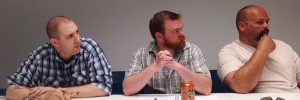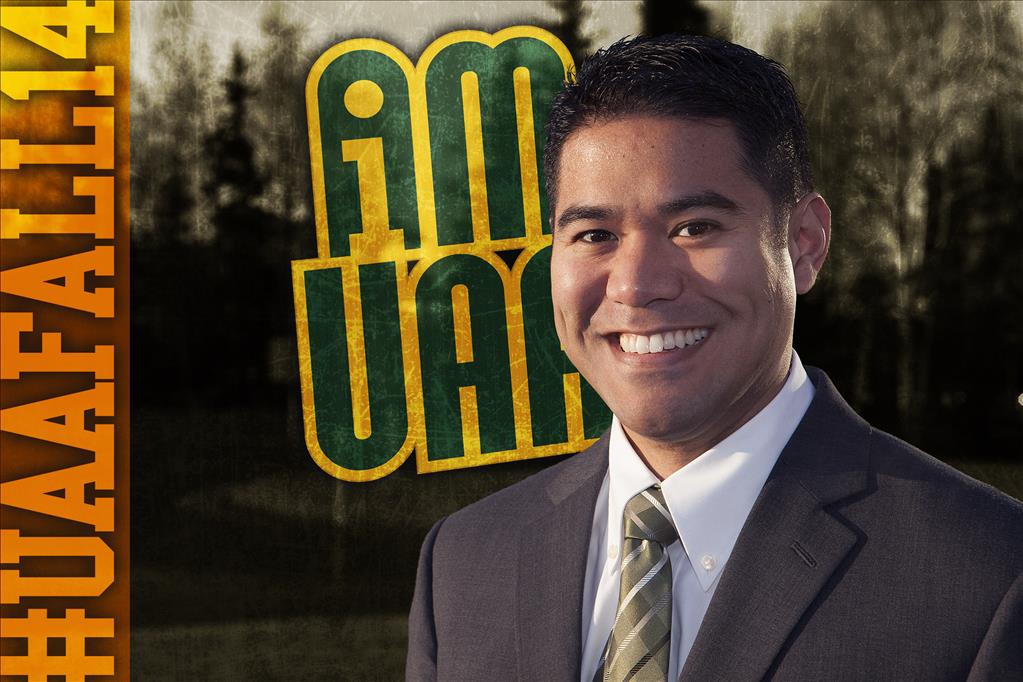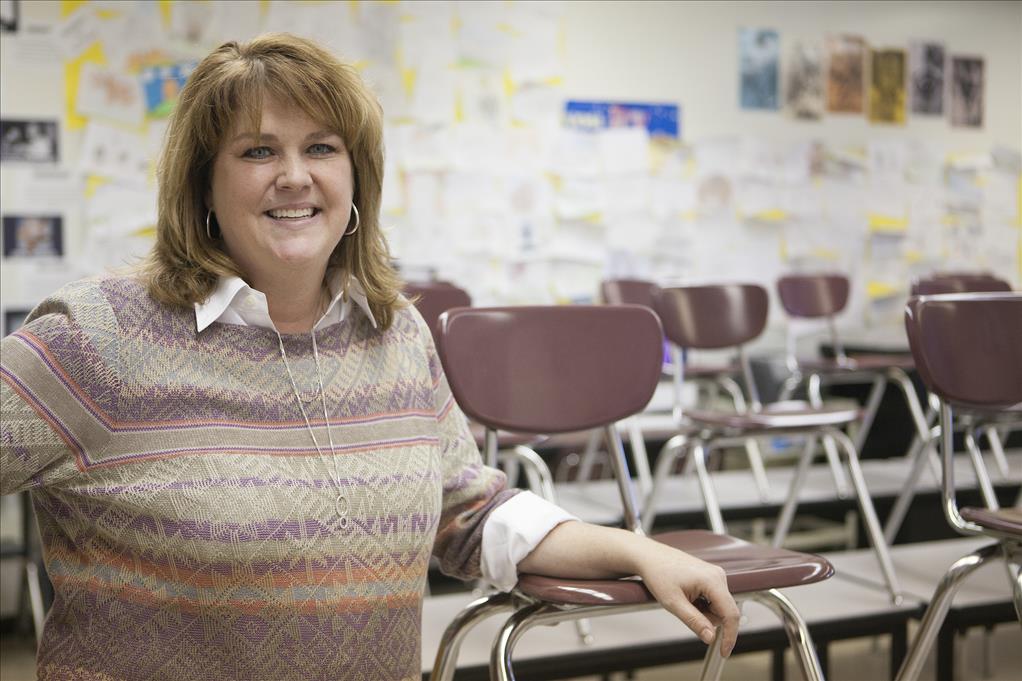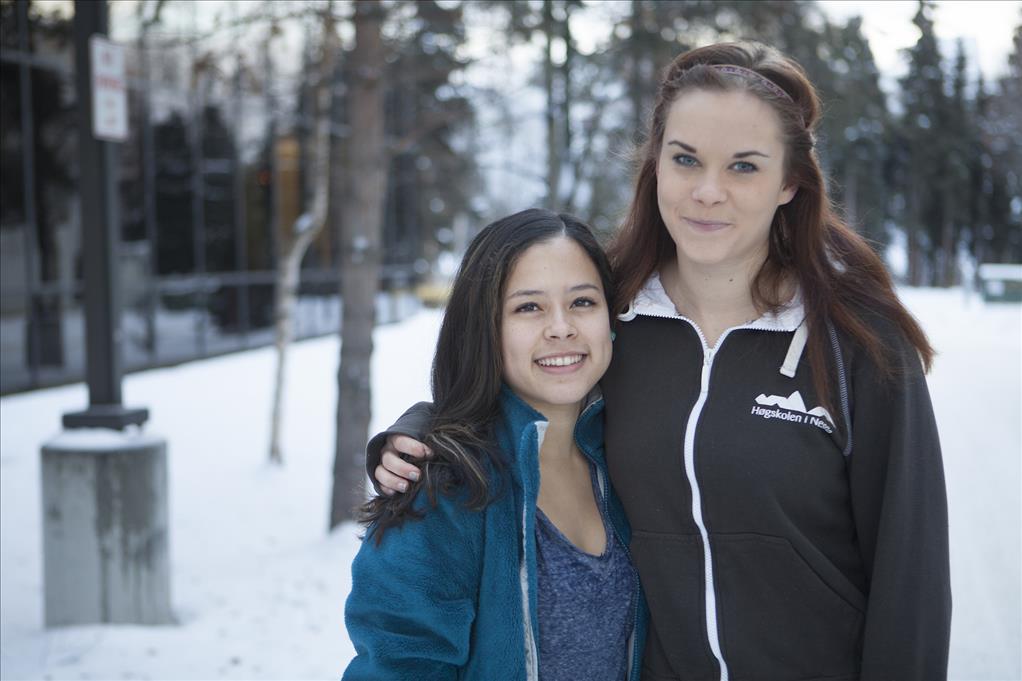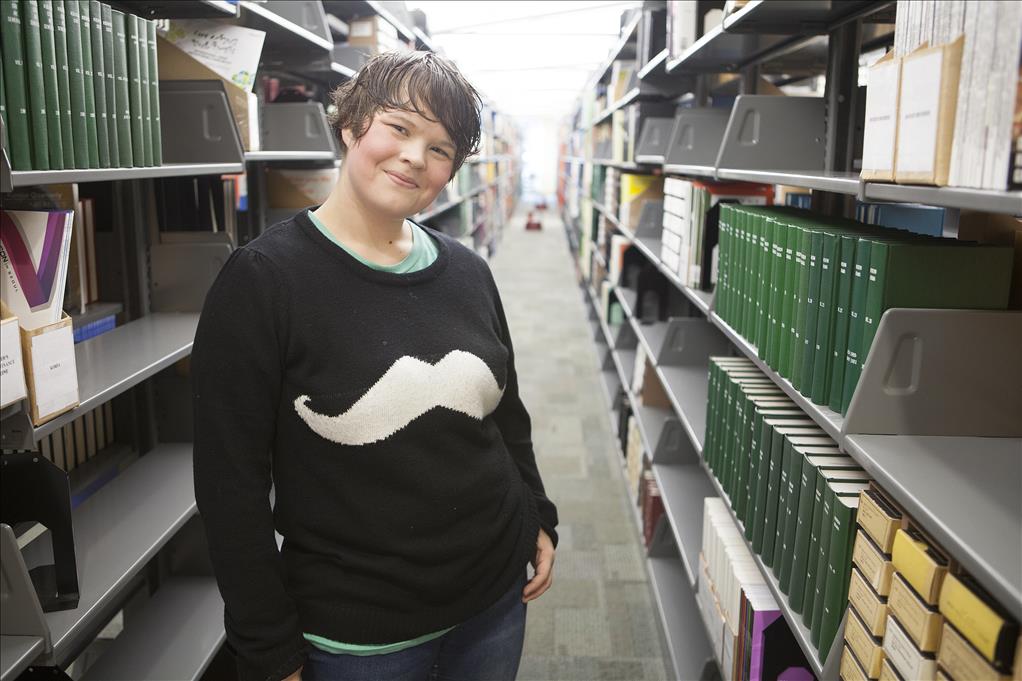Liberal arts majors' secret job weapon: Learning to code
by Kathleen McCoy |
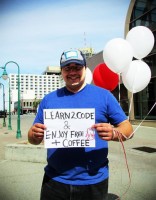
Doug Davey invites newcomers to the Learn 2 Code class on a sunny Sunday in May. The beginner class was embedded in a two-day civic coding event, called Alaska Hackathon, or just hAKathon. (Photo courtesy of hAKathon.)
A pilot project to teach computer coding skills as a path to in-demand post-college jobs for UAA liberal arts majors launched on a sunny Sunday in May.
A half dozen undergraduates and one or two recent graduates gathered around a conference room table at The Boardroom, shared professional office space operated by two entrepreneurs with UAA roots, located in downtown Anchorage.
At the helm of the experimental Learn 2 Code session were Geoff Wright of the local tech firm Pango Media and UAA's Forrest Nabors, an assistant professor of political science. They launched the endeavor after a chance meeting in a local coffee shop when Wright overheard Nabors talking about the local need for skilled programmers.
Good news for liberal arts majors
Perhaps the best news the students heard that day: Your liberal arts degree is an amazing asset. Learning how to code will allow you to problem solve and create in your own area of interest, employing high-demand contemporary technical skills. The Anchorage market is hungry for workers with this skill set, Nabors and Wright told them, and your liberal arts degree will position you well to navigate that job market.
As Wright explained, 75 percent of most job success is communication, a skill that liberal arts majors should excel at. Only 25 percent is coding. "I like to program but I don't love it," Wright said. "I have fun with it. But what was amazing to me was the way the need for this skill interacted with the rest of the world. It's amazing what you can do in the world once you have this skill."
Both Wright and Nabors offered their own career paths as proof that liberal arts degrees are significantly useful in the real world.
Wright majored in philosophy and minored in English at St. Mary's College in Maryland. When he landed in Alaska in his early 20s, he scanned the local job market. Nobody was advertising for a philosophy major. Options included construction work (good money, but grueling over the long haul) or retail (bad hours, low pay).
How it worked for Wright and Nabors
But Wright had dabbled in computer programming as a teen. His dad had brought home an early Apple computer, and Wright spent the years from age 12 to 16 teaching himself to code. At 16 he discovered girls and music, and put away the coding for the next half-decade.
But landing in Anchorage after college and viewing his job prospects, he reached back for that self-taught programming skill. "Could I get a job related to that?" he wondered. Yes, he could. He became a part time computer lab monitor. Then he did tech support for a computer company, then became a systems administrator. Those are the people you call at 3 a.m. when "the system" goes down, so eventually he switched to programming where he could control his hours. Today he is half-owner of Pango Media Inc. doing lots of work with state agencies and nonprofits in Alaska.
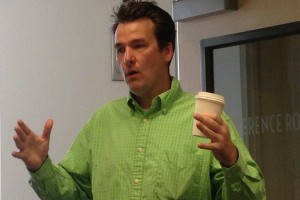
Forrest Nabors, an assistant professor of political science, describes the demand for liberal arts majors with communication and coding skills. (Photo by Kathleen McCoy/UAA)
Nabors began his academic career at Claremont McKenna College, then graduated from the University of Chicago, with a bachelor's degree in classics and political science. He proudly says, "I never took a single pre-professional class" in college.
But he did tap into his entrepreneurial instincts and launched several start ups in Oregon, including Learning.com. He continued his education, earning a master's and doctorate in political science from the University of Oregon, before joining the political science faculty at UAA in 2011. Here in Alaska he partners on a venture capital fund looking for local start ups to invest in. He knows for a fact that the Anchorage market needs workers with competent coding skills, he says.
"I know start up companies that need websites. I can help you all get connected to actual new opportunities in the market. Anchorage needs these skills," Nabors said.
Wright offered one recent example of how the broad perspective a liberal arts major brings to a set of facts actually helps discover better options. Pango Media works with Life Alaska's organ and tissue donor registry. Anyone with an Alaska driver's license has been asked if he or she would like to donate organs in the event of death. Alaskans say yes at a high rate, but there are gaps in coverage. Most donors are located in urban areas, few in rural areas.
Why? Because the donor opportunity is tied to driver's license applications, and few rural residents drive or have licenses to drive. Bingo! The light bulb went off, Wright said. Perhaps a better option would be tying the opportunity to the PFD application, which goes to all Alaska residents.
A big-picture thinker, not necessarily a code expert, is primed to assess this situation and see the better path, Wright said.
Student reaction
After their pitch, Wright and Nabors polled the students: Are you interested? To a one, they were ready to leap.
Among the interested was Hans Rodvik, just back from a semester interning as a legislative aide for Jack Coghill in Juneau. Rodvik said he's interested in a career in politics, and from the exposure he's already had, he knows he needs to learn how to design campaign websites and improve constituent communication efforts. "There's so much room for improvement," he said.
"Hans and I talked about a career in politics," Nabors said. "We know the pay and time demands change a lot. If he develops these software skills, he can be more in control of his own schedule." The 90-day session locks workers into Juneau. Alaska legislators and their staffs are not highly compensated, Nabors noted, and only guaranteed work during the session. The other nine months of the year, they are on their own. "These skills could make you indispensable," Nabors said.
Learn 2 Code embedded in Alaska Hackathon

This nonprofit engages citizens with coding skills to solve local problems. At the May hAKathon, a dipnet app, a new approach to voting to avoid runoffs, and an immersion video game were among the projects worked on. (Image courtesy of hAKathon)
Pilot project organizers are creating a list of interested participants so future sessions can be scheduled. Going forward, Nabors is offering six credits in political science (PoliSci 495) if students pitch a project using their new skills and complete it by the end of spring 2015.
To start, Wright directed students to the Codecademy website where they can begin individual training on their own timetable. This site is free for users and learners move at their own speed. Wright recommended newcomers work through the HTML and CSS tutorials before the group meets again.
Interested UAA students are still welcome to join. Email Forrest Nabors at fanabors@uaa.alaska.edu.
For anyone coming to the realization that they want to learn to code, another local organization to connect with is Alaska Hackathon, where Learn 2 Code began. Visit the Alaska Hackathon Facebook page for follow up on the May event, and to watch for future civic hacking opportunities in Anchorage.
Written by Kathleen McCoy, UAA Office of University Advancement
 "Liberal arts majors' secret job weapon: Learning to code" is licensed under a Creative Commons Attribution-NonCommercial 4.0 International License.
"Liberal arts majors' secret job weapon: Learning to code" is licensed under a Creative Commons Attribution-NonCommercial 4.0 International License.










